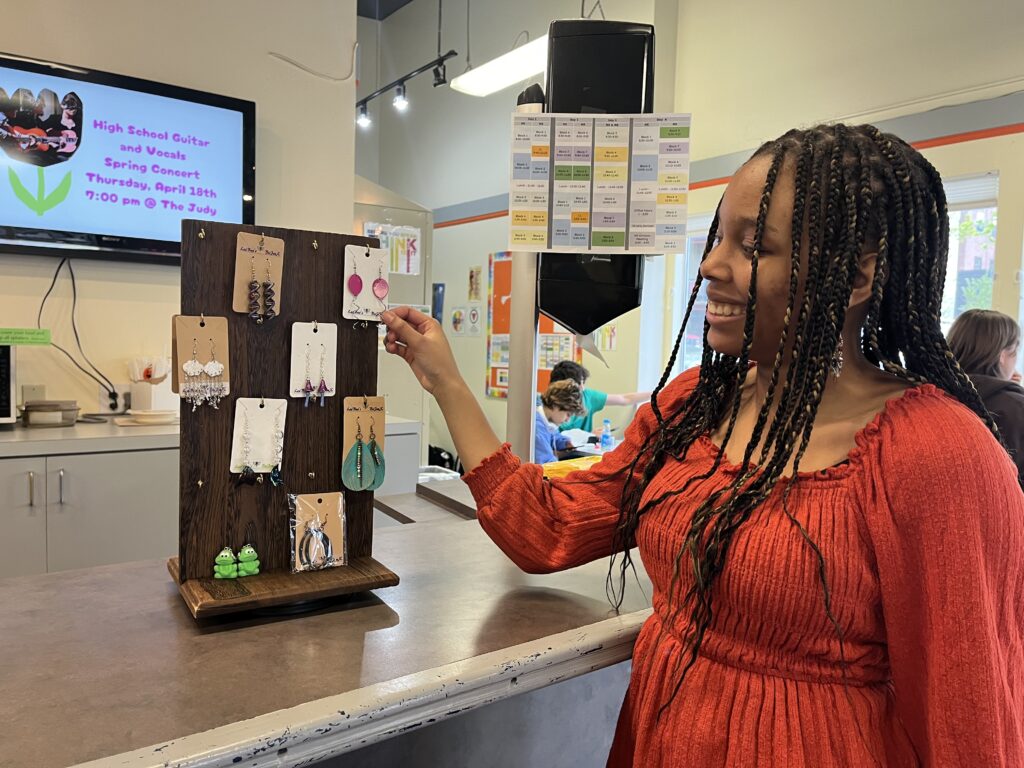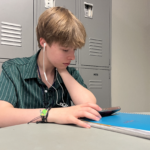NWA sophomores Wren Alger, Aleeyah Rhodes and Miles Potter are among students who’ve started their own businesses. Alger resells fresh baguettes, Rhodes sells her handmade jewelry and Potter sells curated clothing for his vintage resale business.
One Friday afternoon Alger entered Main with an arm full of warm baguettes. Attracted by the aroma, people swarmed to inquire about what he offered. The entrepreneur soon became the hottest topic on campus.
Rhodes’ rotating display of jewelry resided on the kitchen counter top at Main the following Monday. Displayed on hooks was a myriad of dangly earrings, some beaded hearts, some metallic DNA-like spirals and others sparkly, rainbow treble clefs. Student’s hovered near to get a closer look at the accessories.
Potter resells vintage ‘90s streetwear at flea markets in downtown Portland and to the NWA community. If you can’t find him at the market selling with his friends, some of whom also attend NWA, you’ll find his clothes online through Depop, an e-commerce apparel company. His friends also model his style around school to show their support for Potter.
The recent surge in student businesses around NWA raises questions about the ethics of such endeavors. Is promoting entrepreneurship at school a proper use of NWA’s space and resources? Are there standards for a morally sound business that students should uphold?
A few blocks away from NWA is Taylor Street Kitchen, the source of Alger’s baguettes and idea for his operation. Alger’s model, which profits off of another business’ products, struck a chord for some.
“[Thursday], the day prior to selling baguettes, some friends and I amassed two baguettes, some olives, mustard and some meats from Taylor Street Kitchen,” Alger said. “[We] brought them all to English class and assembled a charcuterie board of sorts and that gave us the inspiration to buy a bunch of baguettes and sell them the following day.”
Alger reserved and picked up six baguettes from Taylor Street Kitchen on Friday and for a $2 upcharge, which he designated as a delivery fee, sold them to NWA students. Talk around his business was loud as both supporters and protesters, “haters if you will” Alger notes, gathered in Main around him.
“I heard about Wren’s bread business after heading to Taylor Street Kitchen and attempting to buy a baguette for myself, only to be informed that all of the baguettes had been reserved,” said junior Phineas Silverman, an avid Taylor Street Kitchen supporter. “I had gone with a friend who originally heard about the delicious baguettes from Wren himself.”
Contrarily, some students like senior Ange Meehan thought it was “perfectly adequate” for Alger to sell the bakery’s baguettes at an inflated price because “business is business.”
Equal voices of admiration and outrage echoed throughout Main that day, but despite his customers’ satisfaction with their “warm, buttered, crusty-rustic, yummy baguette” as he puts it, Alger’s bread delivery service terminated immediately after its debut. Instead, he imagines that if he continues his passion of bringing food to NWA students, he will bake it himself and distribute it free of charge.
Like Meehan, Chris Schuck, Head of School, is a “big fan of student entrepreneurs” attributing his liking to NWA’s philosophy.
“We hope to create an environment where our students can and do take action, and engage in productions of all kinds,” said Schuck.
Joanne Kim, Head of High School, said she’s not “categorically against” student businesses at NWA but notes when operations can start to go awry.
“It can get tricky when [students use] school resources or spaces that could be used otherwise for school things for the advancement of personal businesses,” said Kim.
As Julia Cain, Director of College Counseling, puts it, “It’s not always just about money, it [can be] about feeding an interest.” Potter is one of NWA’s young entrepreneurs whose business grew out of an initial fascination. He was first inspired by a friend who had experience selling his own clothes on Depop. Potter’s friend showed him the ropes of buying and selling vintage clothes.
Now, Potter works both independently and with friends to share his style with other people. He notes that although it’s a team effort, he is “definitely the most valuable person there because [he has] the most stuff [and loves] it so much more” he commented.
Like Alger however, Potter doesn’t see a long term future for his business but rather has a specific goal.
“I want to pursue it through high school so I don’t have to have a job, but I don’t want to take it much further,” explained Potter. Later he specifically mentioned he was saving the money he earned from selling clothes to buy a car.
Unlike Alger and Potter’s operations, Rhodes sees a future for her business, Lee Bee’s Bijoux. As of now, she only sells handmade earrings, but plans on expanding her line to include necklaces, bracelets and clip-on earrings. Rhodes also hopes to extend her outreach and increase her sales.
For both Potter and Rhodes it was the initial attraction to entrepreneurship and the help of a friend that led them to start their businesses.
“I made earrings during the summer for the school year so that I would have a fresh, new set to rock for the school season,” Rhodes said. “Then I sent some pairs to a friend.”
Rhodes’ friend then suggested she could and should start selling the jewelry, sparking Rhodes to get the ball rolling. She began planning and brainstorming with her parents the logistics of her business including the name, which stems from the nickname her mom called her growing up: Lee Bee.
Now, Rhodes advocates for her business on her own through consistency and word of mouth. She sets up her earring display frequently in Main and advocates for her products to teachers and fellow students.
Cain recognizes the students following their interests and pursuing them, something she notes as an essential goal of the school and a benefit to the greater community. Alger, Potter and Rhodes are learning skills that are helpful even after high school: problem solving, connection with other people and time management.
“Seeing that students can have an idea and follow through with it is a benefit to everybody,” Cain said. “When people are willing to take a risk and put themselves out there, that’s another benefit. The way students respond to other students who have ideas is also important.”





Leave a Reply